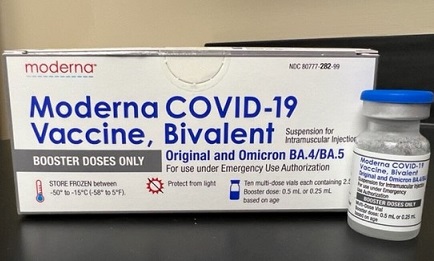BREAKING! German Study Finds That Healthcare Workers Receiving New Bivalent Jabs Experience More Adverse Effects Than Monovalent Booster!
Source: COVID-19 News - Bivalent Nov 11, 2022 3 years, 3 months, 2 days, 15 hours, 33 minutes ago
COVID-19 News: Shocking findings from a study involving the comparisons of the bivalent BNT162b2mRNA jabs and original monovalent boosters by researchers from University Hospital Wuerzburg - Germany and University of Oxford - UK is causing a stir among the research and medical communities.

The study involving healthcare workers has found that those receiving the new bivalent jabs had more adverse effects and were unable to work compared to those who received the monovalent boosters.
The study team has urged more immediate detailed studies to assess as to what is really happening.
To date, no
COVID-19 News outlets have reported on these study findings while health authorities around the world are pushing these bivalent shots extensively!
As a result of the variety of emerging SARS-CoV-2 variants and sub-lineages that are more immune evasive, bivalent COVID-19 shots combining the wild-type spike mRNA with an Omicron VOC BA.1 or BA.4-5 spike mRNA became available.
The study team conducted the first non-randomized controlled study to examine the adverse reactions, PRN (pro re nata) medication intake and inability to work after a fourth COVID-19 vaccination among 76 healthcare workers.
As a fourth dose, either the original, monovalent BNT162b2mRNA (48.7%) or the bivalent BNT162b2mRNA original/Omicron BA.4-5 jabs (51.3%) was administered.
Shockingly, the rate of adverse reactions for the second booster dose was significantly higher among participants receiving the bivalent 84.6% (95% CI 70.3%-92.8%; 33/39) compared to the monovalent 51.4% (95% CI 35.9-66.6%; 19/37) vaccine (p=0.0028). Also, there was a trend towards an increased rate of inability to work and intake of PRN medication following bivalent shots.
As a result of various studies existing only preprints formats reporting inconclusive results in neutralizing antibody levels between the compared shots, the study team stresses that also with their finding, further studies on safety and reactogenicity of bivalent COVID-19 booster shots are urgently warranted as they are highly important to aid clinical decision making in the choice between bivalent and monovalent shots.
The study findings were published on a preprint server and are currently being peer reviewed.
https://www.medrxiv.org/content/10.1101/2022.11.07.22281982v1
To date, this is the first non-randomized controlled study to have examined adverse reactions, PRN (pro re nata) medication intake and inability to work after a fourth jab (i.e. second booster) among HCWs (healthcare workers) involving both the bivalent and monovalent jabs.
All enrolled individuals previously had been administered an EMA-approved COVID-19 basic immunization, and a subsequent third, mRNA-based COVID-19 shot, defined as first booster jab. The second booster was performed with the monovalent BNT162b2mRNA shot or the bivalent BNT162b2mRNA original/Omicron BA.4-5 shot.
All research participants administered with a different COVID-19 shot as second booster were excluded.
/>
As coadministration of COVID-19 and influenza shots might influence immunogenicity and side effects, individuals receiving a simultaneous influenza jab were also excluded.
https://www.medrxiv.org/content/10.1101/2022.06.09.22276030v1
The research protocol was approved by the Ethics committee of the University of Wuerzburg in accordance with the Declaration of Helsinki (file no. 79/21). Data on adverse reactions, inability to work, PRN medication and sociodemographic factors were collected by a questionnaire using REDCap (Research Electronic Data Capture, projectredcap.org). Data analysis was performed using GraphPad Prism 9.4.1 (GraphPad Software, San Diego CA, USA). Null-hypothesis testing was performed using Fisher’s exact test (for gender, smoking, SARS-CoV-2 convalescence, side effects, PRN drug intake and percentage inability to work) and Mann-Whitney U test (for BMI, age and interval between both booster shots). The two-tailed significance level α was set to 0.05. Results 76 HCWs received a fourth dose of COVID-19 shot between the 13th of August 2021 and the 14th of October 2022 with either the original, monovalent BNT162b2mRNA (48.7%,37/76) or the bivalent BNT162b2mRNA original/Omicron BA.4-5 shot (51.3%, 39/76).
The study findings showed that the rate of adverse reactions for the second booster dose was significantly higher among participants receiving the bivalent 84.6% (95% CI 70.3%-92.8%; 33/39) compared to the monovalent 51.4% (95% CI 35.9-66.6%; 19/37) shot (p=0.0028). Bivalent jabbed participants further reported higher rates of adverse reactions in all subcategories.
Furthermore, there were more frequent intake of PRN medication and numerically higher rates of work ability restrictions in the bivalent jabbed group.
The study team concluded that individuals receiving a second COVID-19 booster shot with the bivalent BNT162b2mRNA original/Omicron BA.4-5 vaccine reported adverse reactions more frequently compared to those receiving the monovalent vaccine. Also, there was a trend towards an increased rate of inability to work and intake of PRN medication following bivalent shot.
Limitations of this study are the retrospective questionnaire-based assessment, the lack of randomization and blinding as well as the difference in the interval between both booster jabs between the two groups.
The study focused on a direct comparison between the monovalent BNT162b2mRNA and the corresponding bivalent shot. In the light of preprints reporting inconclusive results in neutralizing antibody levels between the compared vaccines, the study findings and further studies on safety and reactogenicity of bivalent COVID-19 booster jabs are highly important to aid clinical decision making in the choice between bivalent and monovalent shots.
https://www.biorxiv.org/content/10.1101/2022.10.22.513349v1
https://www.biorxiv.org/content/10.1101/2022.10.24.513619v1
https://www.biorxiv.org/content/10.1101/2022.10.31.514636v1
For the latest COVID-19 News, keep on logging to Thailand Medical News.
